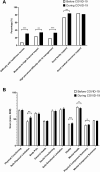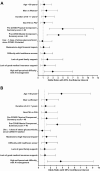The Impact of the COVID-19 Pandemic on Self-Reported Outcomes in Patients With Adrenal Insufficiency
- PMID: 34042985
- PMCID: PMC8194854
- DOI: 10.1210/clinem/dgab334
The Impact of the COVID-19 Pandemic on Self-Reported Outcomes in Patients With Adrenal Insufficiency
Abstract
Context: The COVID-19 pandemic has impacted healthcare environment.
Objective: To determine the impact of the pandemic on self-reported outcomes in patients with adrenal insufficiency (AI).
Design and setting: Prospective longitudinal survey study at 2 tertiary centers.
Participants: Patients with AI.
Intervention: Patient-centered questionnaire.
Main outcome measures: Depression Anxiety Stress Scales-21, Short Form-36, and AI self-management.
Results: Of 342 patients, 157 (46%) had primary AI, 109 (32%) had secondary AI, and 76 (22%) had glucocorticoid-induced AI. When compared to prepandemic, daily glucocorticoid dose and number of adrenal crises did not change. However, patients reported a higher financial impact from AI (34% vs 23%, P = 0.006) and difficulty accessing medical care (31% vs 7%, P < 0.0001) during the pandemic. A third of patients reported difficulty managing AI during the pandemic. After adjusting for duration and subtypes of AI, younger patients [odds ratio (OR) 2.3, CI 95% 1.3-4.1], women (OR 3.7, CI 95% 1.9-7.1), poor healthcare access(OR 4.2, CI 95% 2.3-7.7), lack of good insurance support (OR 2.8, CI 95% 1.3-5.9), and those with a higher financial impact (OR 2.3, CI 95% 1.3-4.3) reported greater difficulties managing AI. Patients were more likely to report a higher anxiety score (≥8) if they found managing AI challenging during the pandemic (OR 3.0, CI 95% 1.3-6.9), and had lower Physical Component Summary (OR 4.9, CI 95% 2.2-11.0) and Mental Component Summary (OR 4.1, CI 95% 1.8-9.5) scores prior to the pandemic.
Conclusions: A third of patients with AI reported difficulties with management of AI during the pandemic, particularly in younger patients, women, and those with poor healthcare access.
Keywords: glucocorticoid therapy; healthcare delivery; psychological resilience; quality of life.
© The Author(s) 2021. Published by Oxford University Press on behalf of the Endocrine Society. All rights reserved. For permissions, please e-mail: journals.permissions@oup.com.
Figures




References
-
- Coronavirus in the U.S.: latest map and case count. The New York Times. 2021. Accessed January 31, 2021. https://www.nytimes.com/interactive/2020/us/coronavirus-us-cases.html.
-
- Bancos I, Hahner S, Tomlinson J, Arlt W. Diagnosis and management of adrenal insufficiency. Lancet Diabetes Endocrinol. 2015;3(3):216-226. - PubMed
Publication types
MeSH terms
Substances
Grants and funding
LinkOut - more resources
Full Text Sources
Other Literature Sources
Medical

